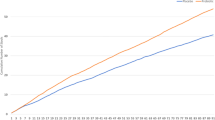Abstract
A randomized, double blind, controlled study was conducted to evaluate a multi-species probiotic product, Duolac® Care, for the efficacy in functional constipation of elderly nursing home residents. Forty participants were randomly assigned to receive either one capsule containing six bacterial strains (2.5 × 108 viable cells/capsule) doubly coated with proteins and polysaccharides (DC group) or one capsule containing the same bacterial strains without the coating layers outside the cell (NC group) twice a day (5 × 108 viable cells/day). After consumption of 2 weeks, NC group showed a significant improvement in a symptom of Rome III criteria for constipation, ‘effort to evacuate’, but failed to show a significant improvement in weekly defecation frequency. By contrast, DC group showed significant improvements in symptoms of ‘effort to evacuate’ and ‘sensation of anorectal obstruction or blockage’ as well as being improved in ‘defecation frequency’. The quantitative analysis of the fecal bacteria revealed that the levels of all the bacterial species consumed were significantly increased after consumption in both groups. However DC group showed larger increases in the bacterial levels than NC group, and the overall bacterial levels in DC group were about 100-fold or greater than those in NC group. Therefore the improvements in the symptoms appeared to be closely associated with large increases of the bacterial species consumed. The double-coating layers of proteins and polysaccharides ensured increase in the levels of bacteria, indicating that the layers function to protect the bacteria from the digestive action in the GI tract. Therefore, Duolac® Care could be a treatment option in functional constipation.
Similar content being viewed by others
References
Chapman, C.M., G.R. Gibson, and I. Rowland. 2011. Health benefits of probiotics: are mixtures more effective than single strains? European Journal of Nutrition 50: 1–17.
de Milliano, I., M.M. Tabbers, J.A. van der Post, and M.A. Benninga. 2012. Is a multispecies probiotic mixture effective in constipation during pregnancy? ‘A pilot study’. Nutrition Journal 11: 80.
Del Piano, M., S. Carmagnola, A. Anderloni, S. Andorno, M. Ballarè, M. Balzarini, F. Montino, M. Orsello, M. Pagliarulo, M. Sartori, R. Tari, F. Sforza, and L. Capurso. 2010. The use of probiotics in healthy volunteers with evacuation disorders and hard stools: A double-blind, randomized, placebo-controlled study. Journal of Clinical Gastroenterology 44(1): S30–S34.
FAO/WHO (2001) Evaluation of health and nutritional properties of powder milk and live lactic acid bacteria. Cordoba, Argentina: Food and Agriculture Organization of the United Nations and World Health Organization Expert Consultation report 1–34.
Favretto, D.C., B. Pontin, and T.R. Moreira. 2013. Effect of the consumption of a cheese enriched with probiotic organisms (Bifidobacterium lactis bi-07) in improving symptoms of constipation. Arquivos de Gastroenterologia 50: 196–201.
Fitzpatrick, L.R. 2013. Probiotics for the treatment of Clostridium difficile associated disease. World Journal Gastrointestinal Pathophysiology 4: 47–52.
Hoveyda, N., C. Heneghan, K.R. Mahtani, R. Perera, N. Roberts, and P. Glasziou. 2009. A systematic review and meta-analysis: probiotics in the treatment of irritable bowel syndrome. BMC Gastroenterology 16: 9–15.
Johanson, J.F., A. Sonnenberg, and T.R. Koch. 1989. Clinical epidemiology of chronic constipation. Journal of Clinical Gastroenterology 11: 525–536.
Kang, J.-H., D.-K. Lee, J.-E. Park, M.-J. Kim, J.S. Lee, J.-G. Seo, M.-J. Chung, H.-S. Shin, and N.-J. Ha. 2013. Dual coating improves the survival of probiotic Bifidobacterium strains during exposure to simulated gastrointestinal conditions. Kor. Journal of Microbiology 49: 275–281.
Koebnick, C., I. Wagner, P. Leitzmann, U. Stern, and H.J. Zunft. 2003. Probiotic beverage containing Lactobacillus casei Shirota improves gastrointestinal symptoms in patients with chronic constipation. Canadian Journal of Gastroenterology 17: 655–659.
Lahtinen, S.J., L. Tammela, J. Korpela, R. Parhiala, H. Ahokoski, H. Mykkänen, and S.J. Salminen. 2009. Probiotics modulate the Bifidobacterium microbiota of elderly nursing home residents. Age (Dordr) 31: 59–66.
Longstreth, G.F., W.G. Thompson, W.D. Chey, L.A. Houghton, F. Mearin, and R.C. Spiller. 2006. Functional bowel disorders. Gastroenterology 130: 1480–1491.
Meijer, B.J., and L.A. Dieleman. 2011. Probiotics in the treatment of human inflammatory bowel diseases: update. Journal of Clinical Gastroenterology 45: S139–S144.
Primrose, W.R., A.E. Capewell, G.K. Simpson, and R.G. Smith. 1987. Prescribing patterns observed in registered nursing homes and long-stay geriatric wards. Age and Ageing 16: 25–28.
Reuter, G. 2001. The Lactobacillus and Bifidobacterium microflora of the human intestine: composition and succession. Current Issues in Intestinal Microbiology 2: 43–53.
Salminen, S., and E. Salminen. 1997. Lactulose, lactic acid bacteria, intestinal microecology and mucosal protection. Scandinavian Journal of Gastroenterology 32: 45–48.
Whitehead, W.E., D. Drinkwater, L.J. Cheskin, B.R. Heller, and M.M. Schuster. 1989. Constipation in the elderly living at home. Definition, prevalence, and relationship to lifestyle and health status. Journal of the American Geriatrics Society 37: 423–429.
Yoon, J.-S., W. Sohn, O.-Y. Lee, S.-P. Lee, K.-N. Lee, D.-W. Jun, H.-L. Lee, B.-C. Yoon, H.-S. Choi, W.-S. Chung, and J.-G. Seo. 2014. Effect of multispecies probiotics on irritable bowel syndrome: a randomized, double-blind, placebo-controlled trial. Journal of Gastroenterology and Hepatology 29: 52–59.
Zoppi, G., M. Cinquetti, A. Luciano, A. Benini, A. Muner, and M.E. Bertazzoni. 1998. The intestinal ecosystem in chronic functional constipation. Acta Paediatrica 87: 836–841.
Acknowledgments
We would like to thank Dr. Seo from Cell Biotech for technical assistance. This study was funded by Cell Biotech.
Conflict of interest
The authors declare no conflict of interest that could inappropriately influence their work.
Author information
Authors and Affiliations
Corresponding author
Rights and permissions
About this article
Cite this article
Yeun, Y., Lee, J. Effect of a double-coated probiotic formulation on functional constipation in the elderly: a randomized, double blind, controlled study. Arch. Pharm. Res. 38, 1345–1350 (2015). https://doi.org/10.1007/s12272-014-0522-2
Received:
Accepted:
Published:
Issue Date:
DOI: https://doi.org/10.1007/s12272-014-0522-2




